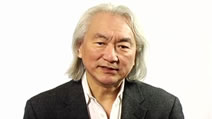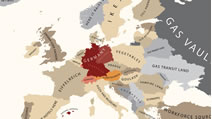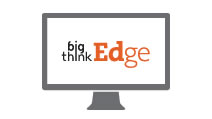Why Are Liberals Twice As Likely to Cheat As Conservatives?
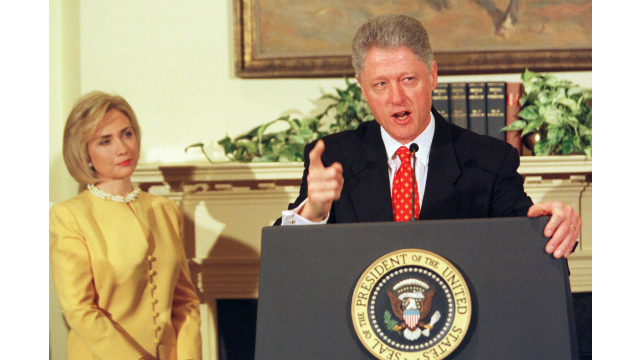
Casual observations of American political scandals seem to suggest that Democrats are more likely to be involved in sexual scandals, while Republicans are more likely to be involved in financial scandals, with the exception that Republicans appear to have cornered the market on closeted homosexual affairs. I’ve always thought that this is probably because wealthy businessmen tend to be Republican supporters, and they are in a better position to bribe their politicians than most voters.
But this suggests a larger, and more interesting, question about the association between political attitude and sexual behavior. Is the impression gained from politicians generalizeable to the American population at large? For example, are liberals more likely to engage in extramarital affairs than conservatives?
To my knowledge, the General Social Surveys (GSS) are the only data set which asks a specific question about extramarital affairs (“Have you ever had sex with someone other than your husband or wife while you were married?”) of a large, nationally representative sample of Americans. And, as the figure below shows, political attitude (on the conservative–liberal continuum) is indeed associated with the likelihood of engaging in extramarital affairs. “Extremely liberal” Americans are twice as likely to have had extramarital affairs as “extremely conservative” Americans (26.4% vs. 13.0%). And the association between political attitude and the likelihood of engaging in extramarital affairs is strictly monotonic; the more liberal Americans are, the more likely they are to have engaged in extramarital affairs.
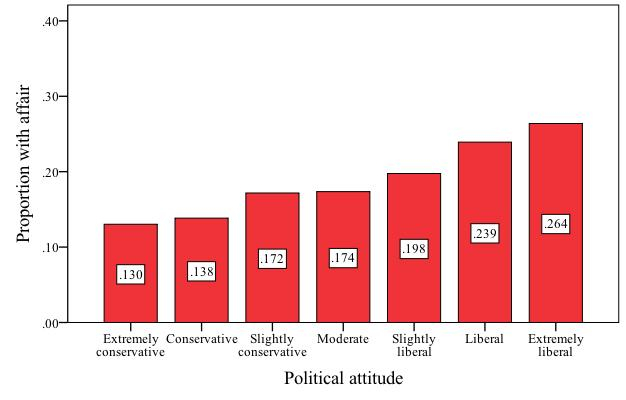
The same association holds for both women and men separately, even though, among women, the association is not strictly monotonic. Nevertheless, “extremely liberal” women (23.6%) are more than twice as likely to have engaged in extramarital affairs as “extremely conservative” (10.0%) or “conservative” (8.8%) women. Similarly, “extremely liberal” (30.1%) men are nearly twice as likely to have engaged in extramarital affairs as “extremely conservative” (16.4%) men. Most interestingly, even though men in general are far more likely to engage in extramarital affairs, “extremely liberal” and “liberal” women are more likely to have done so than “extremely conservative” and “conservative” men.
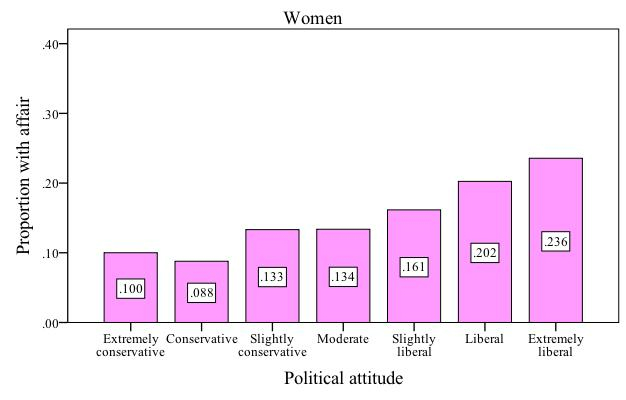
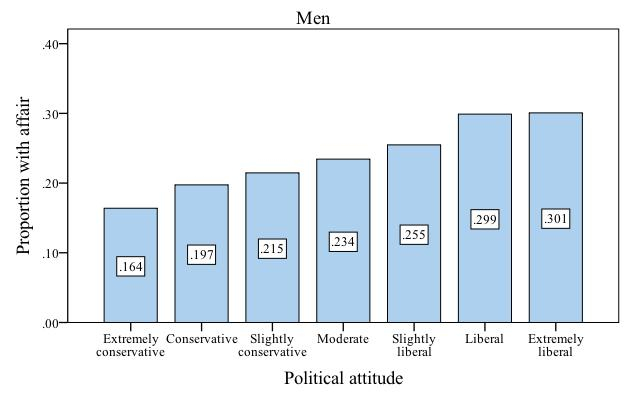
Now, given that the GSS is a survey data set, where respondents verbally answer questions posed to them by the interviewers, I cannot rule out the possibility that liberals are simply more likely to admit to having had affairs than conservatives. There is no way to find out if any of the GSS respondents is lying on any given question; just like any other user of any other survey data, I am at the mercy of the recorded responses in the data.
Even though the GSS does not provide any way to validate the respondents’ verbal responses, another data set provides a unique opportunity to do so. In Wave IV of the National Longitudinal Study of Adolescent Health (Add Health), the survey takers first ask the respondents to report their height and weight, and then, later on the same day, objectively measure their height and weight with a tape measure and a portable electronic scale. By comparing their verbal responses with the objective measures, one can estimate their tendency to lie or at least be inaccurate in their verbal responses.
The Add Health data show that liberals are very slightly more likely to be truthful about their height, but the difference is very small. And liberals are no more or no less likely to be truthful about their weight. So I don’t believe political attitude is correlated with tendency toward lying. Of course, lying about extramarital affairs may be different from lying about their height or weight. But I also know that the same people who lie about their height and weight are also significantly more likely to lie about their voting behavior (whether they voted in the last election). So I do believe there are stable individual differences in their general tendency to lie about many things.
Now assuming that the association between political attitude and the likelihood of having extramarital affairs found in the GSS data is genuine, the question is why. Why are liberals twice as likely to engage in extramarital affairs as conservatives?
It is easy to think of potential explanations for the association, because both political attitude and the propensity to have extramarital affairs are correlated with a large number of biological and sociodemographic factors. For example, liberals are on average more intelligent than conservatives, and more intelligent individuals are more likely to have extramarital affairs. Blacks are simultaneously more likely to be liberals and to have extramarital affairs. Younger Americans and those born in more recent generations are more likely to be liberals, and both are more likely to have extramarital affairs (even though, technically, the likelihood of having ever experienced anything, including extramarital affairs, cannot decrease with age). Conservatives are more likely to be religious, and religiosity is negatively associated with the likelihood of having affairs. More educated Americans with higher incomes are more likely to be liberals, and wealthier Americans (though not more educated Americans) are more likely to have extramarital affairs, etc.
It turns out, however, none of these are the reason for the association between liberalism and extramarital affairs. Simultaneously controlling for IQ, race, age, birth cohort, religiosity, education, and income does not much attenuate the association between liberalism and the propensity to engage in extramarital affairs, and, in fact, slightly increases the association among men.
The figures below show the partial association between political attitude and the propensity to engage in extramarital affairs, net of IQ, race, age, birth cohort, religiosity, education and income, for the whole sample of GSS respondents, and then separately for women and men. The partial associations are always monotonic, except for one extreme category (“extremely conservative” for the whole sample and for women, and “extremely liberal” for men).
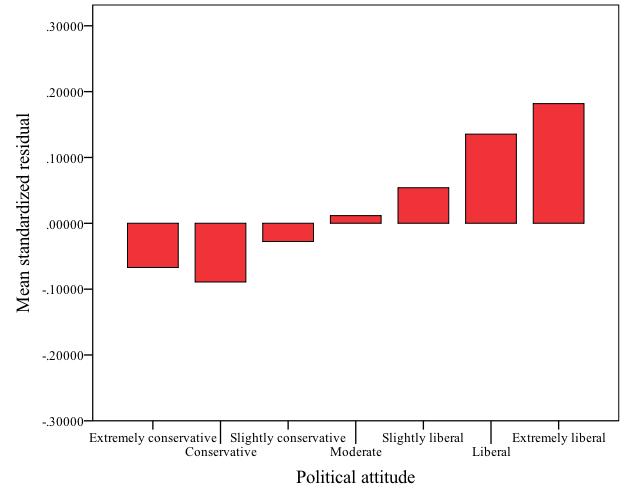
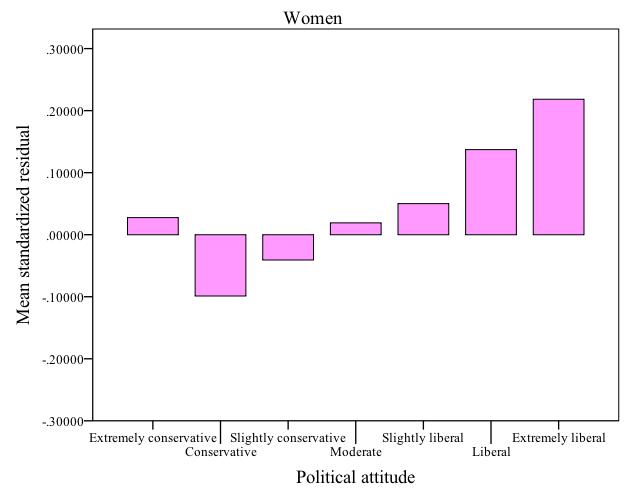
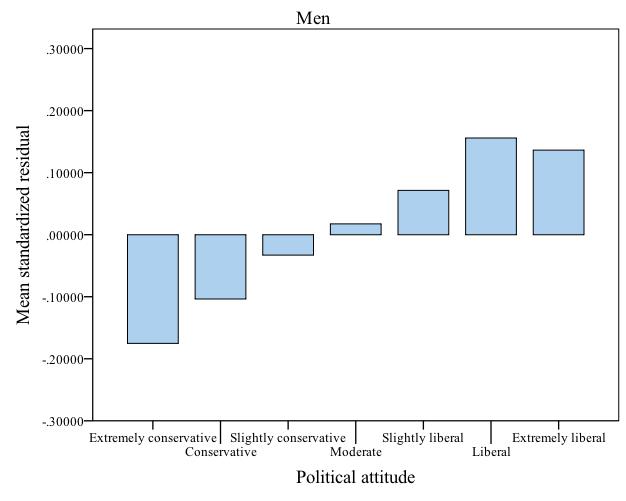
If these biological and sociodemographic variables cannot explain the association between liberalism and extramarital affairs, what can? One possibility is that there are stable individual differences in personality between liberals and conservatives, and these personality differences can potentially explain their differential tendency to engage in extramarital affairs. For example, liberalism is significantly associated with all Big Five personality factors (Openness to experience, Conscientiousness, Extraversion, Agreeableness, Neuroticism). Among these, Openness to experience, which is closely related to another trait “sensation seeking,” is both most strongly associated with liberalism and is probably most relevant to individual differences in the propensity to engage in extramarital affairs. The figure below captures the strong association between liberalism and Openness to experience in Wave IV of Add Health.
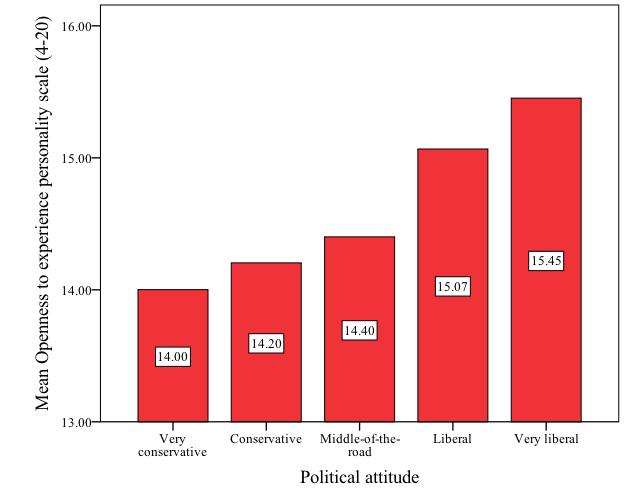
Unfortunately, the GSS does not measure the Big Five (or any other personality factors), and Add Health does not measure respondents’ experience with extramarital affairs, so I cannot examine whether controlling for Openness makes the association between liberalism and extramarital affairs disappear. It is also unclear whether the relatively small (albeit statistically significant) difference between “very liberal” and “very conservative” Americans in their Openness scores – less than 1.5 points on a 17-point scale – can explain the twofold difference in the propensity to engage in extramarital affairs between “extremely liberal” and “extremely conservative” GSS respondents. The question of why liberals are twice as likely to engage in extramarital affairs therefore remains.
Follow me on Twitter: @SatoshiKanazawa
